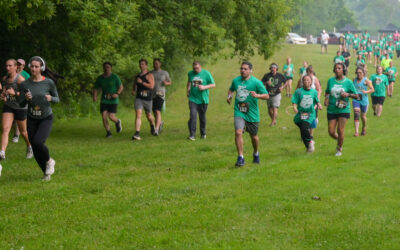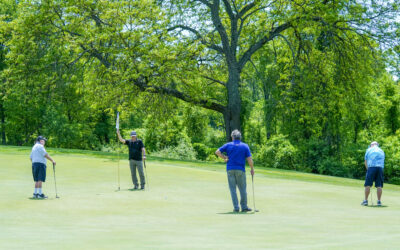OUT-OF-STATE TRIBAL MEMBER DEEPENS CULTURAL TIES WITH VIRTUAL CLASSES
How do you stay connected to your culture during a global pandemic?
Working from home and virtual learning are the new normal, and in-person events can feel like a thing of the past. But as the COVID-19 pandemic continues to stretch on through social distancing, mask mandates, and countless event cancellations, our human need for connection with other people endures.
Such preventative actions are vital for the protection of our vulnerable community members. But staying safe shouldn’t mean losing human or cultural connection – that’s why the NHBP Culture Department began hosting virtual culture classes last summer.
Tribal Members met online weekly to grow their cultural knowledge, covering everything from Drumming to sewing to Pow Wow protocols. With the success of these lessons, the Culture Department soon after started hosting virtual language classes as well, offering Tribal Members the chance to learn Bodwéwadmi {Potawatomi language}.
For some Tribal Members, these classes simply offered a way to deepen their pre-existing relationships with others in the Tribe, and build on their cultural knowledge. But for others, the classes opened up a brand-new opportunity for connection to their Tribe and cultural heritage.
“I’ve been away from home since I left for college, and I’ve been hoping for opportunities to engage with the Tribe this whole time, but there just hadn’t been the avenues to do that yet,” said Tribal Member Vic Hogg. “I would come back to Michigan and try to make it to events on The Reservation, but it wasn’t enough to feel like I was regularly connected. I wasn’t able to spend enough time with people to build relationships.”
Originally from Michigan, Hogg now lives in New York, and has been involved with the virtual classes since their inception, seeing the classes grow from only a couple of people to 10-15 people.
Meeting other Tribal Members and making meaningful connections has been one of the most fulfilling parts of taking the classes, Hogg said.
“It’s been really nice to see other people come and try to learn the same things I’m trying to learn,” Hogg said. “Especially with the language, I often feel like I’m really behind. I don’t speak the language, but I really want to, so it’s been comforting to know that a lot of other people in our Tribe are in the same boat.”
For Hogg, the virtual classes have become a family affair. Most of their family lives too far from the Pine Creek Indian Reservation to stay regularly involved, but going virtual has provided an easy way for them to get connected.
“My mom started joining me at the virtual culture nights, and then we started a group chat with my aunts and my grandma and shared some of the stuff we were learning about different Medicines,” Hogg said. “My mom and I have started talking a lot more about what our ancestry means to us and trying to make sense of our own history.”
Out of over 1,500 enrolled Tribal Members, more than 300 live outside of Michigan, making it difficult for them to maintain cultural connections to the Tribe. Hogg said those living out-of-state still want to be involved, and they hope virtual classes and meet-ups will continue post-COVID.
“I have aunts and cousins out in Vegas who want to be involved, but don’t know how,” Hogg said. “My family was highly assimilated, so we worry that we don’t know a lot of stuff, but the Tribe has become a huge part of our lives. It’s been life-changing to be an enrolled member of NHBP.”
Hogg credits Cultural Specialist Mike Medawis as being a main reason for their continued engagement with the Tribe.
“Mike has been phenomenal, I really appreciate the fact that he’s been willing to try things out and adapt to see what people need,” Hogg said. “It feels welcoming to realize that there’s other people who are feeling the same way I do, like ‘Is it okay for me to be here, is it okay for me to be learning this stuff?’ People can be intimidated learning a new language, but the language classes have been really powerful for me.”
Not having Potawatomi-speaking friends in New York makes being able to participate in language classes “game-changing” for Hogg. They’ve even gone so far as to pepper their home with handmade language flashcards.
Both the virtual culture night and language lessons provide opportunities to make sense of different Potawatomi teachings, and Hogg believes it is a great first step into understanding your cultural heritage and ancestry.
“You can come, you can just listen if you want, but for me it’s been a really powerful way to get to know myself more,” Hogg said. “Especially living out of state, I feel so much more connected to home and connected to my family. It’s given us something to learn about together and to understand our history.”
Interested in virtual classes? Here’s how to join.
Bodwéwadmimwen {Potawatomi language} classes are held virtually every Thursday evening. These will either be posted to the Members Only website or the Culture Department will go live via Zoom.
For Zoom information, please contact Cultural Specialist Michael Medawis at 269.704.4174 or michael.medawis@nhbp-nsn.gov. For more information, please contact Language Associate Jenniffer Wethington at 269.704.8435 or jeniffer.wethington@nhbp-nsn.gov.
Culture classes are held virtually every Monday evening. NHBP Tribal Members can log in to the Members Only website to watch pre-recorded Virtual Culture Night videos at https://members.nhbpi.org/virtual-culture-nights/. For more information, contact Cultural Specialist Michael Medawis at 269.425.0585 or michael.medawis@nhbp-nsn.gov.




0 Comments